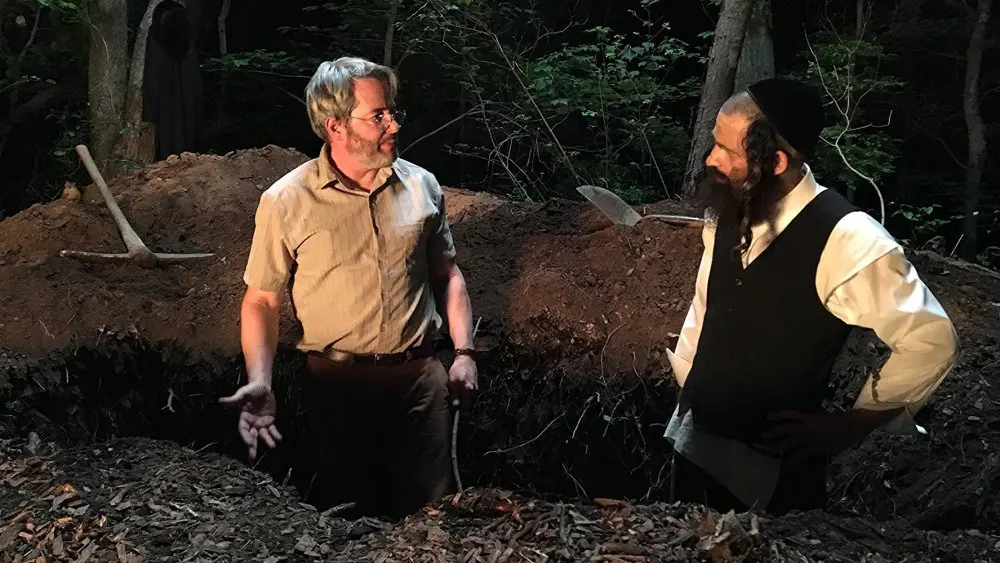Summary
To Dust is a darkly comic film with a wonderfully complex performance of deadpan delivery and deep sadness from Son of Saul star Geza Rohrig.
Men just aren’t meant to grieve. We aren’t built for it. Women have and always will be mentally stronger than us. Maybe that’s because, from a young age, we are socialized to bury our deep feelings, So we have no practice in dealing with them. They can eventually be unlocked later in life by a dark brown liquor or by a pricey therapist. Tony Soprano often lamented that there were no more John Waynes of the world, and that was twenty years ago.
The common theme that men need to be the strong, stoic, and silent type may have gone away. Of course, today, we teach all kids to talk about their feelings and make sure they all get a trophy of their choosing. Shmuel tells his new friend Albert that he buried his wife a mere thirteen hours after she passed. He used a simple pine-wood box with holes on the bottom. Why? So she can touch the earth. He indicates the obvious (turn) To Dust to a man of science who has even fewer answers than he does. Which will slowly start to crack away at a stoic nature, and even a man of great faith will display atypical feelings on his sleeve.
Shawn Snyder’s directorial feature debut (which he also wrote) is a buddy film of sorts that uses darkly comic moments to pick apart the argument of faith versus science, using grief as a tool so we can see which comes out on the other side. His script is steeped in the Jewish faith, as a classmate teases Shmuel’s boys that their father ate their mother’s dybbuk (a malicious spirit believed to be the dislocated spirit of the dead) so much. Hence, they begin to fear what their father did and read up on the Hardy Boys so they can investigate. Snyder appears to be a natural filmmaker, with a steady hand, conveying underlining tones and themes, combined with Alex Marx’s moving musical score.
Xavi Gimenez’s use of photography is very effective. There is a transition scene towards the beginning of the film of Shmuel walking to a lake, as the camera stays on the water while he goes off-camera to flip over a boat. It creates moments of deeper meaning that bring you back down to earth. After some much-needed banter, this brings levity to the picture. After they bury a pig of similar weight to his wife so they can track the rate at which it decomposes, Broderick’s Albert tells Shmuel, “Curiosity is what killed the cat.” Though, his new friend replies, quite literally, “No, curiosity killed the Pig.”
You may think Snyder’s filmography may be filled with horror shorts or scripts. That conclusion could be based on the multiple scenes of what happens to human or animals’ bodies as they decompose on screen. He effectively communicates the human body’s penchant for marbling visually or coming apart. This is shown graphically but also has a certain beauty to it. As a human toe comes apart from the inside and the skin’s flesh forms petals of a flower (a video of a dead piglet decomposing almost makes you take a step back, making you question if its real or special effects, while I concluded, I’d rather live with a little mystery).

The sequences are remarkably self-assured and not added for shock value, as they fit well within the story’s narrative. The result is one of the most literal and honest depictions of death put in a fictionalized film. It refuses to offer comfort to its protagonist while staying true to its underlining theme. It’s that the loss of a loved one “doesn’t get better, just different.”
Shmuel is played by Son of Saul star Geza Rohrig. Who, for some reason me looks like Paul Rudd in a Fiddler on the Roof beard. In all seriousness, he gives a wonderfully complex performance of deadpan delivery and deep sadness. Rohrig is well-grounded here, without a hint of caricatures or stereotypes. His portrayal of Shmuel’s grief is more complicated than black and white. The loss of his wife has him questioning his faith as a Hasidic Jew. His process had become a chronic problem. This started before his wife was buried in a simple box a few weeks before. It was placed exactly six feet below the earth as his faith demands.
Slowly, as he begins to delve into the process of how the body leaves this earth. Not to mention what happens to the soul. He develops intense reactions that are out of his character, displaying verbally hostile words to his new friend. He fears that her Nefesh Elokit will be suffering (the soul that ascends before the heavens to be judged accordingly). Being cleansed of its sins, and when it returns, will her body be available or part of the earth? Matthew Broderick plays his comic foil, who’s liberal, marijuana smoking, rock-loving, wearing his divorced wife’s robe, a man of science. Albert is clearly the flashier role and main source of the film’s empathy. The matter is that Broderick can be (and always has been) a darkly comic actor. He can deliver biting lines with ease and without a hint of regret (“Rigor mortis, that’s arthritis for dead people”).
To Dust is very similar in themes to First Reformed. Another film is about a man faith-based in upstate New York who has lost his faith. Reformed‘s grappling with faith has to do with the world’s injustices and Ethan Hawke’s use of alcohol to deal with his depression and (almost) headfirst dive into madness. Snyder’s film is about a man grappling with his faith after the loss of his wife. At the same time, Reformed‘s soul was saved by love, To Dust’s soul is already gone. This man is worried about its eventual place in the afterlife (then replace Reformed’s heaping helping of desolation with To Dust’s darkly comic undertones).
That being said, some might find the script disingenuous with Shmuel always going against his faith. Even the fact that Broderick’s Albert simply could call the cops and file a restraining order (but where’s the fun or entertainment in that?). The latter may be a valid one, but is the loss of a dearly beloved spouse who passes away from cancer not legitimate enough for someone to go against or question their own deep-seated faith? I think it is ultimately handled with great care in a highly original way that will have me watching Shawn Snyder’s career with a great interest in years to come.




